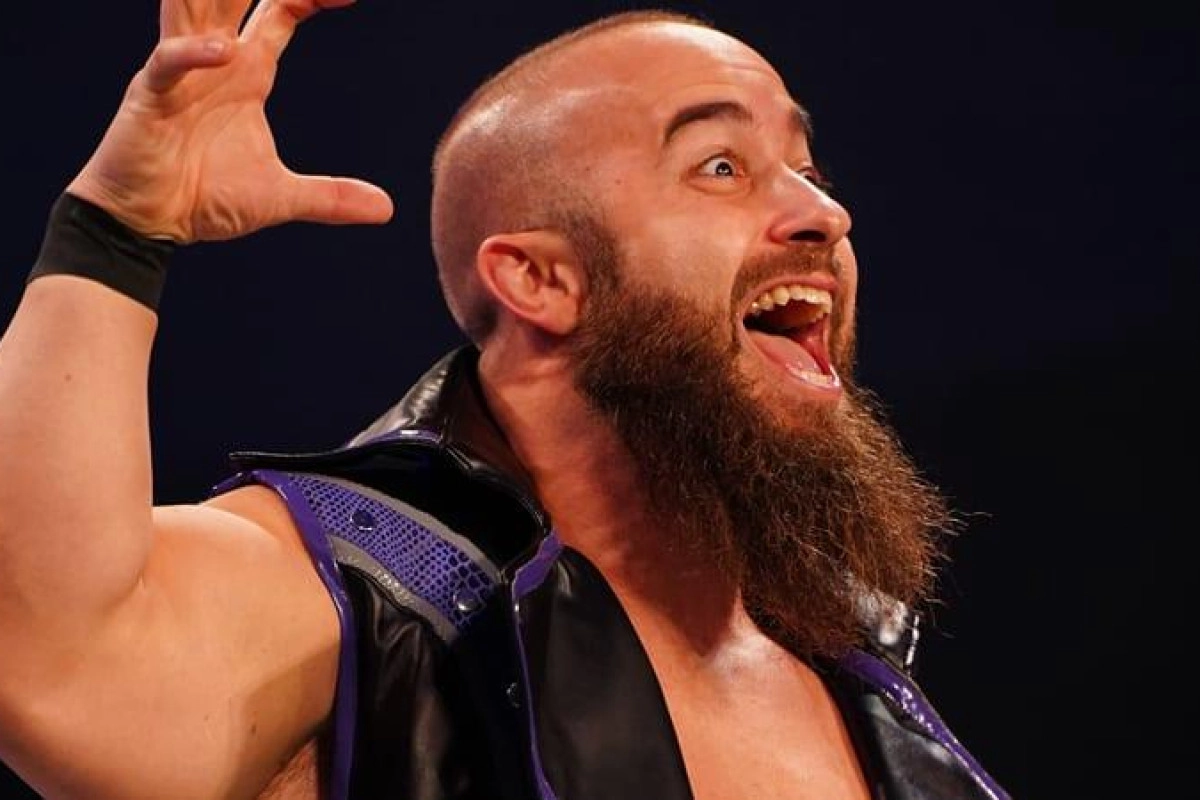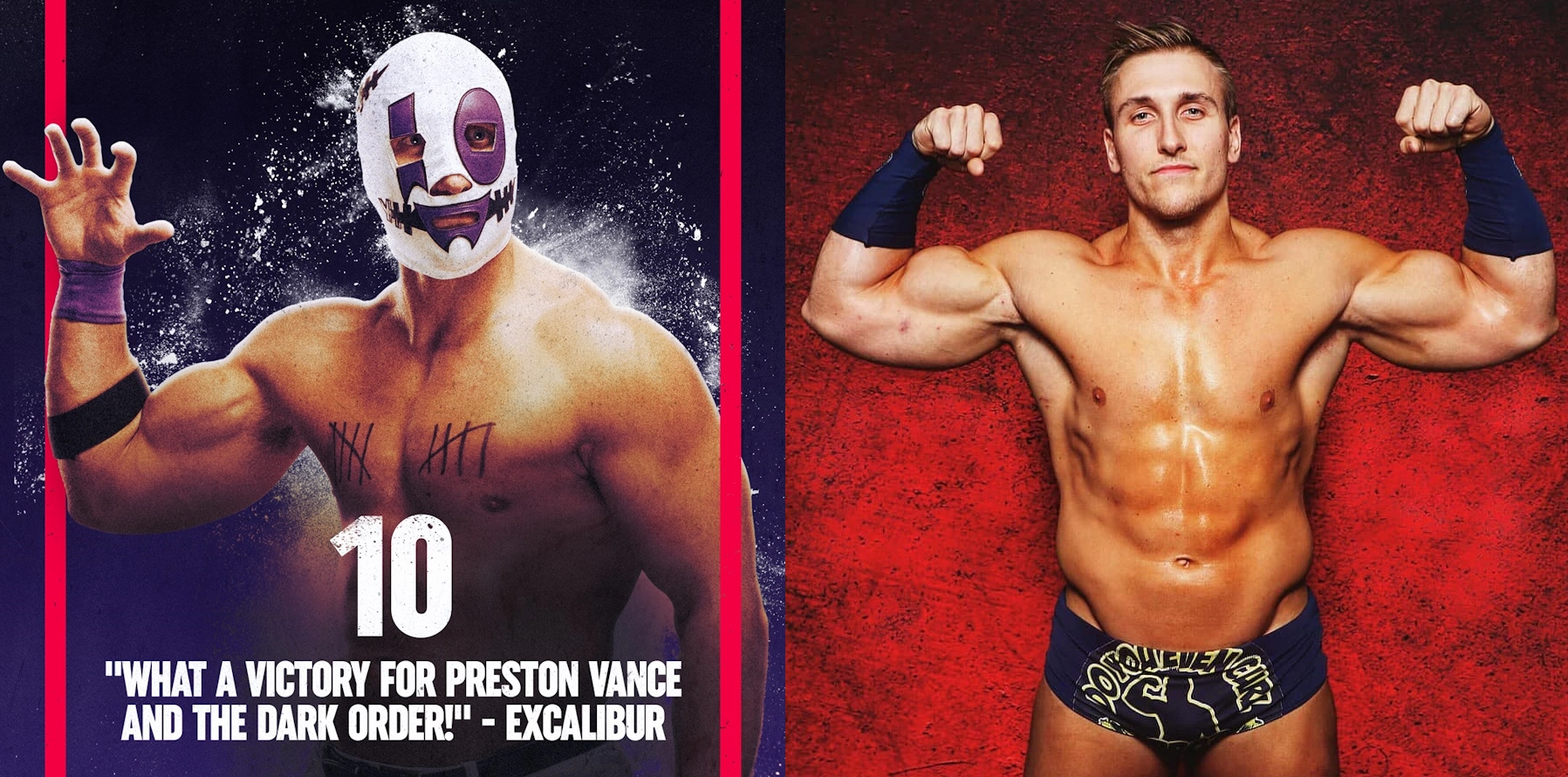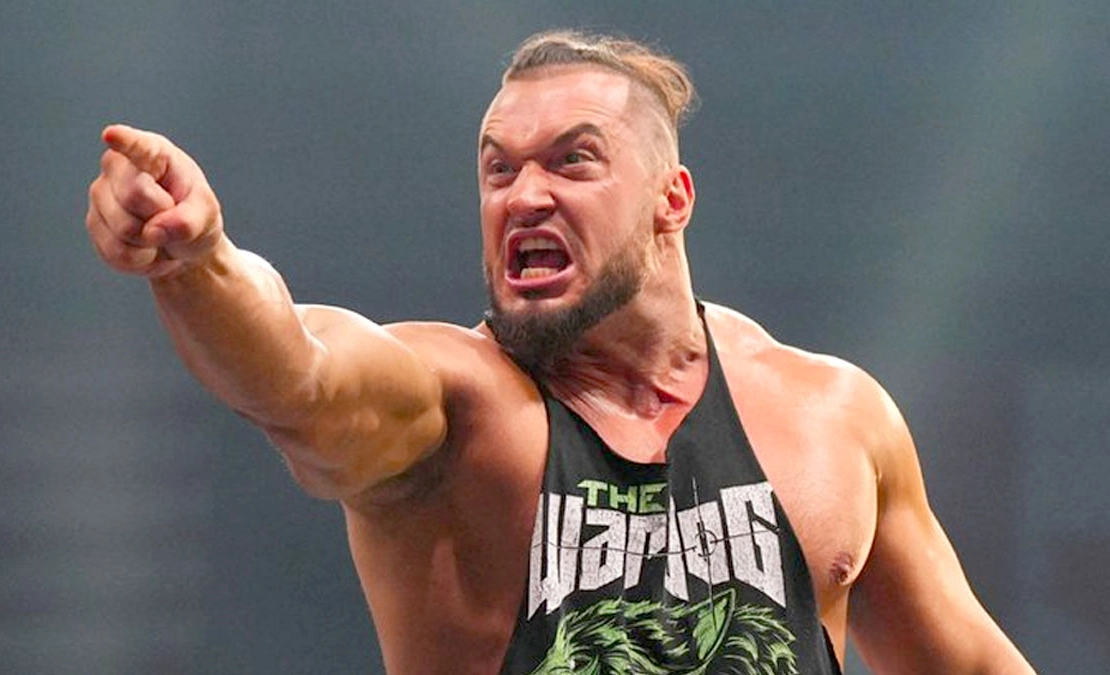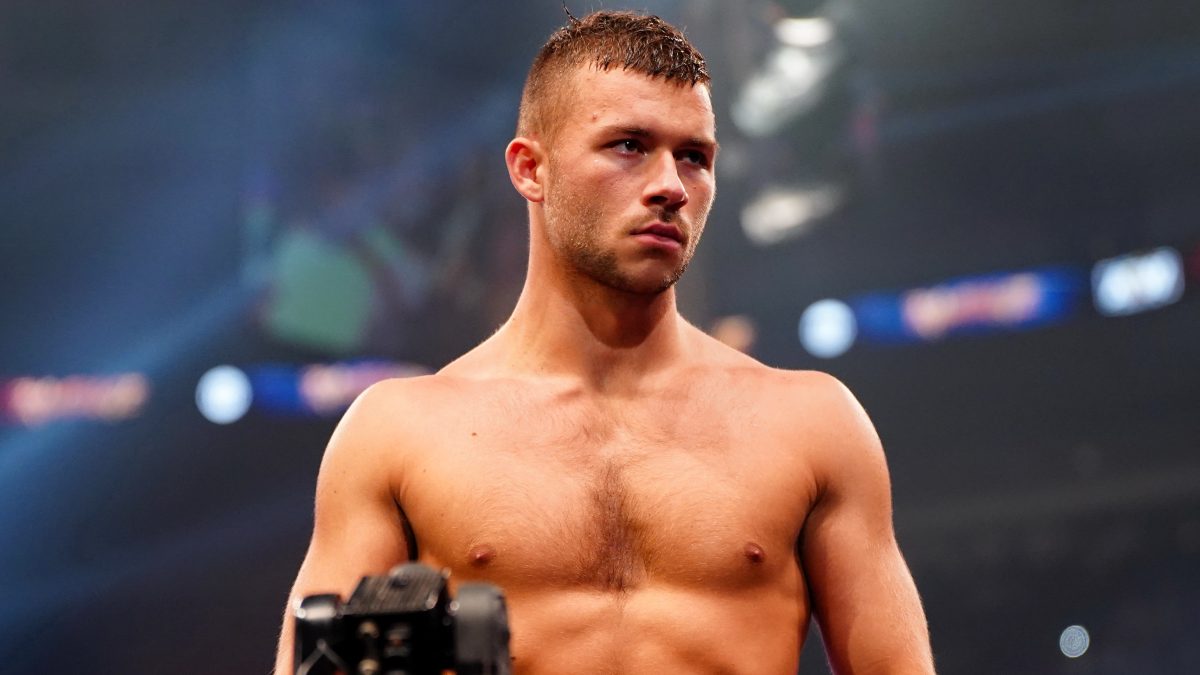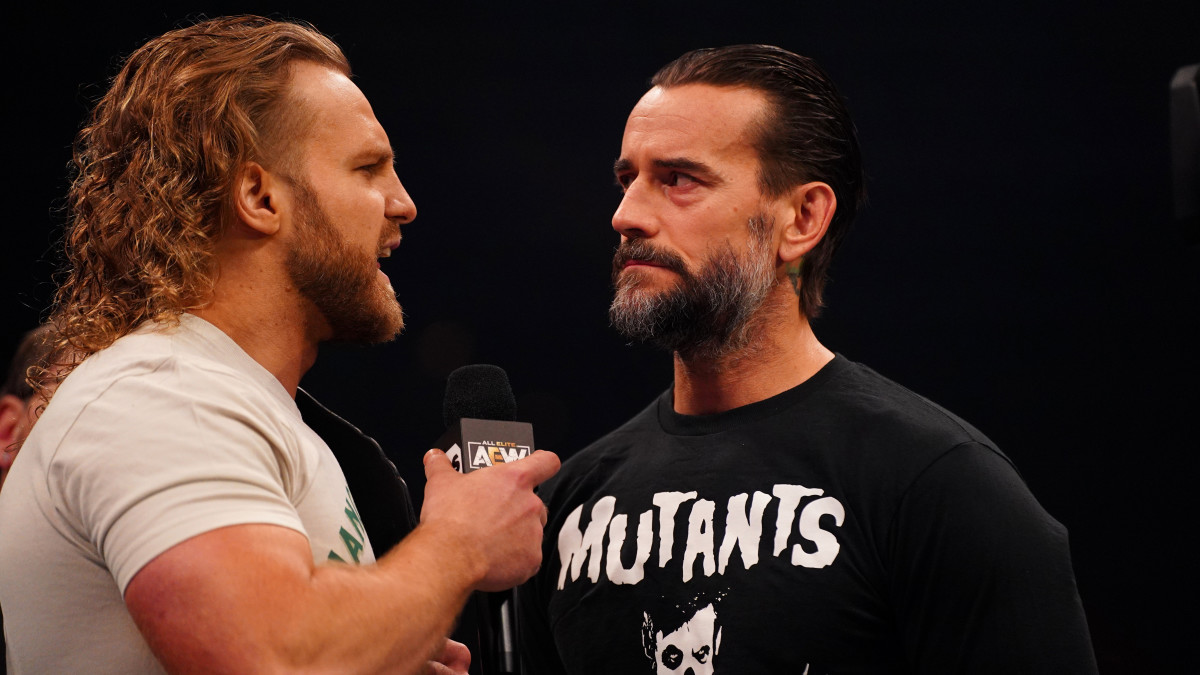In the aftermath of All Elite Wrestling celebrating a record-breaking show in London, as well as a quality show at All Out, I have taken the time to examine specific talents who rose through the ranks to enjoy strong fan support before falling back into the pack with little hope of breaking out in the short term.
This is a subjective editorial filled with opinions that you may agree or disagree with. Please share your thoughts in the comments, and if you would like to add anybody else to the list, let me know. Thanks.
#5. John Silver
Back in the pandemic era, roster morale in AEW remained fairly high. This was evident on shows like “Being The Elite,” where many watched as the talent enjoyed themselves backstage. One of those who shone brightest was John Silver, who became known as “Johnny Hungee” for an amusing interaction with Wardlow. In general, the Dark Order was having a lot of fun, notably because of Brodie Lee pushing the stable forward on TV, but also because of John Silver’s natural charisma.
His character began to shine through on TV, and he would regularly get strong reactions. In the Dark Order, aside from Brodie Lee, he enjoyed the biggest push as a singles star. Silver was booked in matches with Darby Allin for the TNT Championship, and later Adam Cole and Bryan Danielson. He lost these encounters, but crowd reaction suggested that fans were taking a liking to him. In the tag team scene, he partnered mostly with Alex Reynolds, and sometimes with #10, but they did not find any success. He’d win more often than not on “Dark,” but lose most of his matches on “Dynamite” and “Rampage.”
There was a real opportunity to make more of John Silver from 2020-2021, but then the Dark Order began collapsing. Partially because of the tragedy of us losing Brodie Lee, which could not be helped, but more so because AEW outright failed to do anything significant with the Dark Order. Even loosely recruiting Hangman Adam Page was not enough to save it. They had some spotlight, but soon enough, Page distanced himself from the stable without explanation, and then Dark Order randomly called him out on it.
The whole stable was heartbroken by Page’s shunning, but it came across as whiny and pathetic. Page was never a serious member of the stable, yet they were so upset that he had pretty much ignored them for months? How does that make us care for the Dark Order? It doesn’t. All it did was make the stable even more irrelevant. And where is it now? Somehow it still exists, when it should have been put out of its misery a long time ago. I found it funny that Anna Jay & Tay Melo, who for a while were the only Dark Order members doing anything, defected to the Jericho Appreciation Society without any mention of their former stable on TV.
It is clear to me, and probably most fans who have ever paid the slightest attention to the Dark Order, that a talent like John Silver would prosper more so on his own. The stable has been holding him back for years.
#4. Preston Vance
“Preston Vance, once known as #10 of the Dark Order, emerged as a rising star within the faction. His progress gained momentum, especially in the aftermath of Brodie Lee’s passing, when the spotlight shifted onto him. Alongside Brodie Lee’s son, Negative One, #10 appeared poised to step into a leadership role within the Dark Order. The reactions he garnered from fans and his in-ring prowess demonstrated his ability to hold his own among the best.
However, as time went on, the stability of the Dark Order began to crumble. Internal disputes arose, with Evil Uno vying for leadership, leading to member departures and a noticeable absence from television. Upon their return, the faction’s grievances were directed at Hangman Page for his perceived abandonment. To compound matters, Preston Vance made a significant move by unmasking and aligning with La Facción Ingobernable, alongside Andrade, Rush, and others. Initially, this heel turn held promise, given Vance’s strong presence. Unfortunately, circumstances took a turn for the worse when Andrade and Rush vanished from television. Left without a stable leader, Vance’s appearances became sporadic.
It’s perplexing to witness how both John Silver and Preston Vance, two talents on the brink of breaking out, ended up sidelined due to a lack of strategic booking. While new talent influxes may have played a role, the removal of programs like Dark and Dark: Elevation likely exacerbated the issue. The preference for established stars over promising talents like Vance and Silver highlights the importance of consistent care and booking to establish their worthiness of airtime.
#3. Wardlow
Ever since Wardlow stepped through the door, he has been labeled a main event star of the future. As MJF’s muscle, the abuse he received from his employer did wonders to endear him to the fans. Everyone wanted to see him snap and destroy MJF because they built it up so well. When it finally happened, it could be said that Wardlow received some of the loudest reactions of anybody. He had finally stepped out of MJF’s shadow to stand on his own as a fully-fledged (in kayfabe) member of the roster. It wasn’t long before he set his sights on gold, like the TNT Championship, which he won by defeating Scorpio Sky.
And then what? Well, not much. His powerbomb symphony finish got over to some degree, but outside of that, there wasn’t anything interesting going on. I assumed he would enjoy a lengthy title reign, but it didn’t happen. AEW took Wardlow down this strange path of losing the title several times. First to Samoa Joe, only to win it back, and then to Powerhouse Hobbs before winning it back again, before finally losing it to Luchasaurus. And then he disappeared from television. In a recent interview at a fan fest, he said this:
“I do not know when I’ll be back, hopefully soon. I’ve been off TV for almost a couple months and I’ve been very depressed. Wrestling is my everything that makes me happy. So, today I feel like me again for the first time in months. I just want to say thank you guys for coming out because you guys really flip a switch in my mind, my heart that I needed, so thank you.”
What is interesting about Wardlow’s AEW career so far is that while MJF essentially made him with their storyline, winning the TNT Championship three times didn’t. Claiming a championship only means something if the talent and the company put in the effort to make it so. With Wardlow, it felt much like they were spinning their wheels and going nowhere. And for his sake, when he does finally return, I hope Tony Khan and whoever helps with creative have something or someone he can really work with. Otherwise, I don’t see the point. He might as well ask WWE if he can develop under Shawn Michaels.
#2. Daniel Garcia
The Jericho Appreciation Society was a letdown. There, I said it. I’ve enjoyed watching Chris Jericho perform for over two decades, but that stable turned out to be one of his worst decisions, with one exception. Initially, the ‘sports entertainer’ gimmick was a humorous jab at WWE’s approach, but it grew stale quickly. That was until Bryan Danielson had a match with Daniel Garcia and respectfully hailed him as a ‘professional wrestler’ of quality.
This planted the seed for an eventual face turn, with Garcia shedding his sports entertainment persona to establish himself as a credible star recognized for his professional wrestling skills. The teasing continued, with Garcia often displaying confliction. For a brief period, he even turned face against Chris Jericho and the JAS. Though he was convinced to return to the JAS, the teases persisted. I believe every AEW fan who followed this story knew it was building towards an epic payoff. It could have been the ultimate elevation for Daniel Garcia.
And then it didn’t happen. He just… fell back in line with the JAS. He continued with the sports entertainer act. Many months later, the JAS finally severed ties with Jericho. But was there any mention of Daniel Garcia shedding his sports entertainer persona? Nope. It was swept under the rug. The opportunity to transition Daniel Garcia from a goofy, dancing sports entertainer to a rugged, no-nonsense professional wrestler seems to have slipped away. The chance to pull the trigger on that storyline may never come again.
Fortunately, he’s only 25 years old, leaving ample time to repackage him in a different way. Yet, looking back at how over Daniel Garcia was at the peak of that storyline, it’s disheartening that Tony Khan, Bryan Danielson, and Chris Jericho, collectively, couldn’t see it through to a satisfying conclusion.
#1. Hangman Page
When Adam Page debuted with All Elite Wrestling, I had seen some of his work, but I wasn’t overly impressed. You may remember him being the first to challenge for the AEW World Championship, alongside Chris Jericho. Not that he didn’t deserve to be on television, but his spot on the roster was clearly aided by his friendship with The Elite. Then, gradually, as Hangman Page leaned more into his gimmick to introduce ‘Cowboy S**t,’ he began to understand what he needed to do. His tag team with Kenny Omega was exceptional, as was the fallout from it. It transformed Page from a questionable upper-midcarder into a potential World Championship contender, eventually leading to his AEW World Heavyweight Championship victory.
However, while the moment of winning the World Heavyweight title was glorious, his 197-day title reign following his program with Bryan Danielson left much to be desired. Former champions like Chris Jericho, Jon Moxley, and Kenny Omega demonstrated that Hangman Page hadn’t connected with the audience enough to hold such a prominent position. This was exacerbated by a surprising lack of compelling booking during his reign. While he had some title defenses against Lance Archer and Adam Cole, his involvement with the Dark Order faded into obscurity. As World Champion, one of the most memorable things I heard him say in an interview was:
“When I was middle school or high school age, I had super bad social anxiety, like diagnosed medication social anxiety. I remember one time sitting at my desk in the middle of taking a test, my entire body turned flush red. I started sweating. Then I would become aware of this is happening to my body. So then it gets 10 times worse. My eyes start watering. I had terrible anxiety when I was high school age.
I think wrestling helped me get out of that to an extent because, not that I had low self worth or anything like that, but wrestling was always my passion and where I felt comfortable and what I like doing. Once I was able to do that and see some success in it, being surrounded by 20 people, 200 people, 2,000 or 20,000 people, as that grew, I got more comfortable with that and with myself.”
This isn’t a criticism; it merely highlights that Adam Page has dealt with social anxiety since childhood, which could explain occasional comments or behavior that may be perceived as a lack of confidence or possibly overconfidence. I was somewhat taken aback when he made another statement in an interview:
“Oh boy, I don’t know, I’m stubborn, I don’t take advice. It’s a good question and that’s probably the honest answer. I listen to people say things, but very rarely do I listen hard. I was part of the movement that created the entire company and I’m a world champion, I don’t know that I need their advice. I’ll certainly listen, but there is something to be said about trial and error and doing it on our own. I take more pride in that.”
This comment didn’t sit well with many, including myself. In any professional field, there are individuals with more experience from whom we can learn. Asserting that you are above seeking advice because you were part of the company’s founding and are a world champion can come across as exceptionally arrogant. I listened to the actual interview, and I must admit that the quote reads harsher than how he voiced it. Nevertheless, these things tend to blow up on the internet, leading to heat within the industry, especially from the older generation.
Page responded to the heat with the following statement:
“The reports that I ‘don’t take advice’ have been greatly exaggerated, perhaps by no one more so than me. Advice and feedback, particularly from those who have come before, have always been and always will be welcomed and appreciated. My self-deprecating and dry insistence otherwise just comes from a place of being more personally interested in wrestling as an art than a sport. It would’ve been hollow for Picasso to try to paint a Mona Lisa. I kinda thought I’d have been asked about it by now and could’ve clarified. I just wouldn’t want any of the older generation, especially those whose work with us is vital and unknown to fans, to feel that their wisdom is dismissed.”
Then came the CM Punk feud, which, for those paying attention, brought significant drama. Part of it lay on Page for apparently “going into business for himself” during a segment with Punk, but part of the blame rests with Punk for not making more effort to understand that some talents won’t conform to his way of doing things. This pattern eventually culminated with Punk insulting Page at the All Out media scrum and making digs at other talent by stating he “has to work with children.” Even upon Punk’s return following months of uneasiness, he couldn’t resist mocking Page’s inability to sell merchandise:
“Earlier today, I went to a local supermarket and I figured out why they call him Hangman. It’s because the pegs in the Toy aisle are full of Hangman action figures. Because nobody wants to buy them. He is a peg warmer, unlike me who moves merchandise and pops ratings and sells toys.”
Furthermore, after The Elite returned to television, Hangman Page casually reunited with The Young Bucks and Kenny Omega. From my perspective, they undermined the entire storyline aimed at elevating Page as a main event player. The narrative was intended to demonstrate that Page could thrive on his own without The Elite, but putting him back with them only served to validate the argument that AEW had pushed him too hard and too quickly. Page would likely concur with this sentiment. He fulfilled his role as requested, but the push failed to solidify his status as intended.
There was a time when Hangman Page received regular, enthusiastic reactions from fans. Today, he is a shadow of that, and no one person is solely to blame. Swerve Strickland recently touched on this while speaking with Page, stating that if he had the same opportunities, he wouldn’t have squandered them. Management may have felt that while Page did his part leading up to winning the title, there may have been a lack of motivation afterward. We can’t know for sure, but what is clear is that if Hangman Page hopes to reclaim those heights, he must put in the effort and aim even higher. More importantly, he needs to demonstrate that he genuinely listens to the legends of the business, as fans will appreciate knowing that he values their experience.
Conclusion
The journeys of John Silver, Preston Vance, Wardlow, Daniel Garcia, and Hangman Page in AEW have been marked by highs, lows, and missed opportunities. These narratives underscore the delicate interplay between talent, creative direction, and fan reception in professional wrestling.
As we follow their careers, it’s clear that success in AEW is far from linear. What matters most is the ability to adapt, learn from wrestling’s veterans, and continually strive for excellence. These wrestlers’ stories mirror the ever-evolving landscape of All Elite Wrestling, a promotion that blends innovation with tradition, captivating fans along the way. Thanks for reading!
Also Read: 5 WWE NXT Fresh-Faced Talents Most Likely To Succeed
You can keep up with all your wrestling news right here on eWrestlingNews.com. Or, you can follow us over on our Twitter and Facebook pages.
In the world of professional wrestling, talent rises and falls, and sometimes opportunities are missed. This article examines the journeys of five specific talents in All Elite Wrestling (AEW) who experienced strong fan support before falling back into the pack with little hope of breaking out in the short term. These talents include John Silver, Preston Vance, Wardlow, Daniel Garcia, and Hangman Page.
John Silver, also known as “Johnny Hungee,” gained popularity during the pandemic era of AEW. As part of the Dark Order stable, Silver’s natural charisma and entertaining character shone through on TV. He had notable matches with top stars like Darby Allin, Adam Cole, and Bryan Danielson. However, as the Dark Order began to collapse and lose relevance, Silver’s potential was held back by his association with the stable.
Preston Vance, also known as #10 of the Dark Order, emerged as a rising star within the faction. After the passing of Brodie Lee, Vance appeared poised to step into a leadership role. However, internal disputes within the Dark Order and a lack of compelling booking led to Vance’s appearances becoming sporadic. The preference for established stars over promising talents like Vance highlighted the importance of consistent care and booking.
Wardlow, known as MJF’s muscle, was initially built up as a main event star of the future. His powerbomb finisher and potential for greatness were evident. However, his title reign as the TNT Champion lacked compelling storylines and direction. Wardlow’s disappearance from television and his recent statement about feeling depressed raised concerns about his future in AEW.
Daniel Garcia’s storyline within the Jericho Appreciation Society (JAS) showcased his potential as a professional wrestler. Teasing a face turn and shedding his sports entertainer persona, Garcia had the opportunity for an epic payoff. However, the storyline was abruptly dropped, leaving fans disappointed. Despite being only 25 years old, Garcia’s potential was not fully realized.
Hangman Page’s journey in AEW has been marked by highs and lows. Initially, he struggled to connect with the audience but eventually found success with his ‘Cowboy S**t’ gimmick and tag team with Kenny Omega. His AEW World Heavyweight Championship victory was a significant moment, but his title reign lacked compelling booking and failed to solidify his status as a main event player. Page’s comments about not taking advice and his reunion with The Elite undermined his storyline of independence and growth.
These stories highlight the delicate interplay between talent, creative direction, and fan reception in professional wrestling. Success in AEW is far from linear, and it requires adaptation, learning from veterans, and striving for excellence. As fans, we hope to see these talents reach their full potential and make the most of their opportunities in the future.

